2011-2012 marked the 29th year of the National Council’s flagship Arab-U.S. Student Leadership Development Program, the Model Arab League (MAL). The Models are similar in organization and format to the older and more widely recognized Model United Nations, with its 193 members. An important difference between the two is that the MAL focuses only on the 22 member countries that comprise the League of Arab States. Established in February 1945, and thereby pre-dating the founding of the United Nations, the Arab League is the world’s oldest regional political organization dedicated to, among other things, the diplomatic and peaceful settlement of disputes.
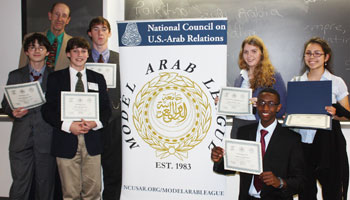
Student delegates from Bishop Ireton High School in Alexandria, VA, with faculty advisor Mr. Michael Rauer, display their award certificates after the National High School Model Arab League.
The Models provide primarily American but also Arab and other international students’ opportunities to develop invaluable leadership skills. In few if any other ways do the student participants have a comparable chance to work with their fellows for common goals and shared interests. We know of no other opportunity that allows emerging leaders to learn firsthand what it is like to put themselves in the shoes of real-life Arab diplomats and other foreign affairs practitioners. In the process, the students come to realize unavoidably and inevitably how different these international relations realities are in comparison to what they previously thought and wrongly assumed to be true based on what they had read and “learned” or not read, “not learned” and therefore not known before.
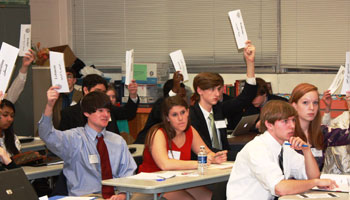
Students vote on a resolution in the Political Affairs Council at the Atlanta High School Model.
Grappling with the international challenges of representing the needs, concerns, interests, and foreign policy objectives of a government other than their own, and especially that of an Arab country, has obvious merit in and of itself. In the process, students not only deepen their knowledge and understanding of the Arab world and its peoples. In addition, they develop and practice useful analytical, organizational, writing, editing, and public speaking skills. In so doing they strengthen their ability to engage in the art of reasoned argument and spirited debate. In the process, they have an unparalleled opportunity to hone and refine leadership attributes that for many are often unavailable or otherwise difficult to acquire in the course of reading a book, viewing films, videos or television, listening to a specialist, participating in academic classes, attending briefings, or accessing blogs and the Internet.
Educating, Training, and Developing Today Tomorrow’s Arab-U.S. Relations Leaders
The Models enhance students’ abilities to debate the national and regional defense, economic, political, social, and related issues and policies of the Arab countries they choose to represent. Using parliamentary procedure — for those who have never had an opportunity to learn or practice it before, they soon acquire a mastery of the art — the students wrangle with one another over matters pertaining to the proper course of concerted policy formulation and action with regard to such weighty matters as Palestinian affairs, human rights, justice, economic development, defense cooperation, and the environment.
As in real life public policy debates, participants have no choice but to learn how to advocate their viewpoints with facts, command of language, clear oral and written expression, and the passion of their convictions as well as all the logic, force of argument, and erudition they can muster in support of their position.
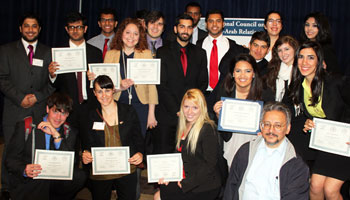
The delegates from Georgia State University display their Outstanding Delegation certificates after the National University Model in Washington, DC. (Right, front row, is their faculty advisor Dr. S. Rashid Naim).
What is more, the student participants have no option but to try to be as effective as they can within prescribed requirements and processes, including tight time constraints. For example, in keeping with established rules of order and depending on the issue and procedural dynamics in play, the Models’ Secretaries General, Assistant Secretaries General, and Standing Council Chairs (each of whom is elected by their peers) are tasked with limiting the authorized debates to variants of thirty seconds, one minute, three minutes, and/or a maximum of five minutes.
There’s no mistaking either the rarity or the human resource development value of such an enterprise. Arguably few American students and other young adults receive or have received as comprehensive a level of training and firsthand experience as the Models provide in practicing and mastering what it takes to become proficient in public affairs leadership abilities. The more than 2,200 students that annually participate in the National Council’s 15 Annual Model Arab Leagues held in 11 cities throughout the United States are unique in more than number and nature. Performing under the watchful eyes of their faculty advisers and adult judges, the students are eager to prove to themselves, their families, and their teachers that they are worth every penny of the investment in this one-of-a-kind component of their education. To that end there is no way around their having to study hard and conduct serious research in advance of the Models.
Strengthening and Expanding Arab-U.S. People-to-People Ties for the Period Ahead
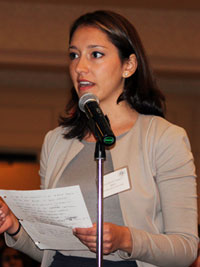
Students who participate in the National Council’s Model Arab League Program develop persuasive public speaking skills that are invaluable regardless of whatever career they pursue.
First-time readers of the Council Chronicle often ask whether it is the case that, in some cities, there is more than one Model. The answer is yes. The reason has to do with popular demand. That is, what typically happens at the end of numerous Models is that most of the student and faculty participants immediately register to participate in the next year’s Model at the same venue. As powerful and welcome a validation of a given Models’ value as this is, there is another side to the coin. That is, no sooner does a Model end than veteran Model Arab League student participants rush to reserve space for their participation in the following year’s Model. The result is that there is little if any room for new universities and students that would like to participate. Indeed, students newly aware of such opportunities and who want to participate would be unable to do so were new Models not established to accommodate the growing number of applicants. It is in this way that the early 1980s original number of slightly more than 100 participants has grown twenty-fold to more than 2,200 per year and continues to increase.
Beyond the proven leadership development achievements that are the hallmarks of the Models’ experience, an additional incentive in recent years has been student and faculty awareness of the increasing number of extraordinary additional benefits for which Model alumni become eligible. Indeed, participation in the Models has become a gateway for Model delegates winning National Council fellowships granting them entry into, first, the Council’s Annual University and High School Student Summer Internship Programs in the nation’s capital and, second, the Council’s Arabic Language and Study Abroad Programs in Egypt, Jordan, Lebanon, Morocco, Oman, and Yemen. In addition, for the past two years, Saudi Arabia and the United Arab Emirates have each sponsored study visits to their countries for outstanding MAL delegates.

The Council’s Ten-Week Summer Internship Program, the academic component of which is chaired by Dr. John Duke Anthony (7th from left), provides students a unique opportunity to work and study in the nation’s capital.
In the past year, a record 73 young American alumni of the National Council’s Model Arab League Program received, as a direct result of their participation in the Models, coveted educational fellowships or grants of one kind or another. Acceptance and fulfillment of the requirements of each of these awards has enabled the students to strengthen their Arab-U.S. leadership skills in preparation for careers in international affairs and service in their country’s public and private sectors.
In the Council’s 2011 ten-week summer internship programs that combined professional work experience in international affairs organizations with an academic seminar on Arabia and the Gulf, 12 of the 32 interns were Model Alumni. In the Council’s first two cultural immersion visits for university students to Saudi Arabia in 2011, all 22 of the participants were Model Arab League Alumni. In addition, three Council 2011 Model Arab League participants were awarded an all-expenses paid six-week Arabic language fellowship, complete with home stays, in Oman; and (2) five dozen cadets and midshipmen from the U.S. Military Academy, U.S. Naval Academy, and U.S. Air Force Academy participated in separate Council two-week cultural immersion programs in the UAE in partnership with the internationally renowned Abu Dhabi-based Emirates Center for Strategic Studies and Research.
Scope and Focus of the Council’s Network for Model Preparation and Participation
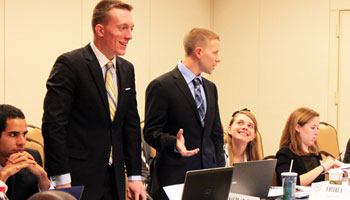
Student delegates representing Saudi Arabia make a speech in favor of a motion during the National University Model.
In preparation for participating in a Model, all the students are able to benefit from assistance provided by the National Council’s national network of supporters and volunteers. For example, each of the participants is able to obtain additional assistance by accessing the Council’s staff, the entirety of which is comprised of alumni of the Model Arab League Program. Many also gain from contacting the numerous Arab embassies that support the Models. Still others are guided by one or more of the faculty advisers in 800 American universities where alumni of the Council’s Malone Faculty Fellows in Arab and Islamic Studies Program are resident. What makes the Fellows unique sources of information and insight is that that they have participated in the Council’s educational and cultural immersion study abroad programs in one or more of the 12 Arab countries that have hosted the Fellows.
From November 2011 through April 2012, the National Council sponsored and administered 15 Model Arab Leagues in 11 U.S. cities for 2,200 students in more than 100 American secondary schools and universities. University Model Arab Leagues were conducted in Boston, Massachusetts at Northeastern University; Allendale, Michigan at Grand Valley State University; Oxford, Ohio at Miami University; Spartanburg, South Carolina at Converse College; Washington, DC at Georgetown University; Little Rock, Arkansas at the University of Arkansas; Houston, Texas at the University of Houston; Oakland, California at Mills College; and Salt Lake City, Utah at the University of Utah. High School Models were conducted in Atlanta, Georgia at The Marist School; Boston, Massachusetts at Northeastern University; Little Rock, Arkansas at the University of Arkansas; Newport News, Virginia at Christopher Newport University; and Washington, DC at Georgetown University.
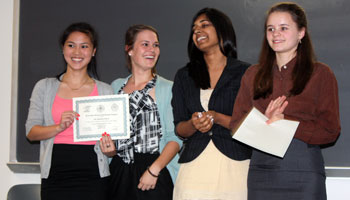
High school students from The Madeira School in Virginia accept Outstanding Delegate awards at the National Model.
The National Council’s Model Arab League Program helps prepare students to be knowledgeable, well-trained, and effective citizens as well as civic and public affairs activists. The skill sets acquired and practiced in the course of the Models are designed to serve the participants well regardless of the career or profession they elect to pursue. As MAL Program Coordinator Megan Geissler has noted, “We’re providing future leaders the experience of being in the shoes of and having to deal with someone they might never understand or be able to deal with effectively otherwise. The beneficiaries are America and the world’s coming generation of diplomats, other international relations specialists, business representatives, and educators as well as humanitarians, peace and justice activists, armed services personnel, and future conflict preventers as well as resolvers.”
FURTHER READING:
